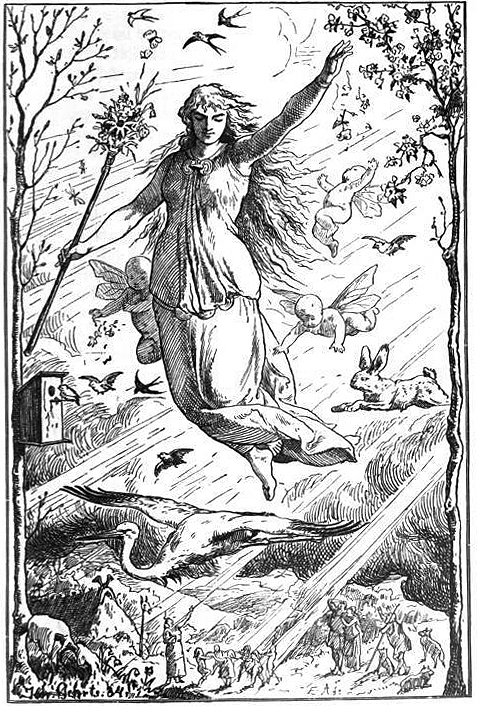- 3-minute read
- 21st April 2019
The Etymology of Easter and ‘Easter Egg’
Happy Easter! Maybe today is one of religious celebration for you. Alternatively, you may be gorging on chocolate eggs. Both are fine (we only judge people based on their grammar). But have you ever wondered where the word ‘Easter’ comes from? Let us explain its etymology!
Where Does Easter Come From?
If you grew up in the UK, you should know that Easter has something to do with Jesus. In particular, the holiday we know today is rooted in a celebration of Jesus’ resurrection. But the word ‘Easter’ itself has much older roots, predating Christianity entirely!

Most scholars think we get the word ‘Easter’ from Ēostre, a pagan goddess of spring and fertility. In fact, she even gave her name to Ēosturmōnaþ, which is what the Anglo Saxons called the month of April. And while we may have forgotten Ēostre herself, we still celebrate Easter in April!
The pagan festivals associated with Ēostre were absorbed into Easter when Christianity spread to England. This may be why we still associate Easter with symbols of spring and fertility, such as eggs and rabbits, rather than just with Christian symbols and icons.
We also see the influence of Ēostre in languages like German, where ‘Easter’ is Ostern. But most languages refer to Easter using a word derived from the Latin term Pascha. This originally denoted the Jewish festival of Passover, but it was later applied to the resurrection of Jesus.
Find this useful?
Subscribe to our newsletter and get writing tips from our editors straight to your inbox.
What Is an ‘Easter Egg’?
We’ve mentioned chocolate eggs above, as well as eggs as a symbol of fertility. But nowadays, you can also find ‘Easter eggs’ in video games, in films, and on websites, among other places.
These ‘Easter eggs’ are not made of chocolate. Nor could you hatch them. Rather, this is a term for a hidden feature or message of some kind. We call a hidden feature an ‘Easter egg’ because you have to search for it, like the prizes that adults hide for kids in an egg hunt at Easter.
And while the idea of a hidden ‘Easter egg’ does not stretch back to Anglo-Saxon times, it is older than you might think! The first ‘Easter egg’ was created in 1979, when programmer Warren Robinett inserted his name into the Atari game Adventure.

(Photo: Scott Canoni)
So maybe one day we’ll forget the origin of Easter and think it’s a celebration of hidden features on DVD submenus. But until then, whether you’re Christian, Pagan, or even a computer programmer from the 1970s, we’d like to wish you all a very happy Easter Sunday.




